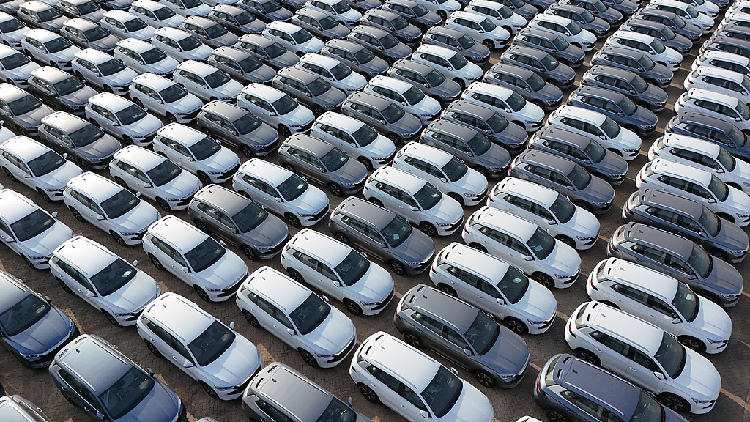European Commission's Tariffs on Chinese Electric Vehicles are a Misstep
The European Commission plans to implement countervailing duties (CVDs) as high as 35.3 percent on electric vehicles (EVs) imported from China. This decision follows a 4 October qualified majority vote in which EU countries did not object to the imposition of these duties, which will be added to the existing 10 percent tariff on imported cars in the European Union. The duties are a mistake. They will harm EU citizens more than help them, and they will eventually backfire on the European automotive industry.

The European Commission is preparing to impose countervailing duties of up to 35.3 percent on electric vehicles from China, adding to the existing EU tariff of 10 percent on imported cars, following a qualified majority vote by EU countries on October 4 that did not oppose the action.
Imposing these duties is misguided. They are likely to harm EU citizens more than help them and may ultimately backfire on the European automotive industry.
Industry sources indicate that Chinese-made electric vehicles (EVs), many produced in joint ventures with EU and U.S. manufacturers, now meet global quality standards while being offered at significantly lower prices. This price competitiveness is at the heart of the policy discussion surrounding these duties. Moreover, it is understood within the industry that subsidies from China and elsewhere have a minor impact on market dynamics. Instead, the price and quality advantages of Chinese EVs stem from substantial economies of scale, lower labor costs, a technological and materials edge in batteries, fierce competition among over 100 manufacturers based in China, and their first-mover advantages.
In the animated debate around the countervailing duties (CVDs), one oversight is the significant cost of persistently high EV prices, which disadvantage all consumers, particularly those on lower incomes. For many economically disadvantaged EU citizens, especially in rural regions, a car remains their primary means of transportation. However, the implementation of CVDs could prevent many of these citizens from transitioning to greener vehicle options. In contrast, consumers in countries like Japan, Norway, and the UK, which have yet to impose CVDs, will be in a more favorable position, along with the middle classes in developing nations such as China, Mexico, or Thailand.
The CVDs are likely to result in three major long-term consequences.
To begin with, there will be retaliation from China. The country has already taken steps to challenge the CVDs at the World Trade Organization (WTO), and there is a risk that the EU could lose under mandatory arbitration. I contend that the European Commission's rationale for such elevated duties is weak. The methodologies employed by the Commission to calculate the CVDs tend to considerably and systematically overstate the subsidies provided by China, a conclusion aligned with industry perspectives. While there is consensus that Chinese subsidies exist, their impact should be viewed with caution.
Secondly, the CVDs will protect EU EV manufacturers from the pressures of global competition, diminishing their incentives to lower costs and innovate. Once implemented, these duties—which have a legal lifespan of five years—will be exceedingly challenging to rescind because the industry, including carmakers, suppliers, and their workforce, will adapt and grow dependent on them.
These duties will deter European manufacturers from pursuing integrated value chains with Chinese partners and their competitive suppliers. As a result, the influence of EU carmakers in the Chinese market could diminish, particularly if China retaliates against them, which remains a plausible scenario. Even if EU producers find shelter within their home market, they will still face competition in China, the rapidly growing markets of developing countries, and numerous other international markets. The possibility of them falling behind is a genuine concern.
Thirdly, the CVDs signify a further fragmentation of global trade and a potential decoupling of Western economies from China. The economic ramifications and uncertainties stemming from such fragmentation are well established and will affect the EU as well. For instance, the U.S. market is already closed to Chinese EVs. Should Donald Trump regain the presidency, he has signaled intentions to impose an additional 10 percent tariff on all imports, including those from the EU.
Additionally, it is simplistic to assume that trade disputes among major powers will remain confined to economic matters. A trade conflict with China could create rifts within EU alliances, embolden hostile actors at its borders, accelerate an arms race in the region, and complicate efforts to manage nuclear proliferation both nearby and globally—trends that are already becoming disturbingly visible.
Is there a more effective path forward? Yes, there is. The European Commission's initiative to negotiate a price cap with the Chinese—a commitment that the price of their EV exports will not significantly undercut the price of domestic products—is an incorrect approach. This tactic undermines consumers and would deprive the EU of tariff revenue.
Rather, the focus should be on increasing transparency in Chinese automotive subsidies and making them less disruptive to trade. There should be a clause that if the import of Chinese EVs poses significant harm to the EU industry—which it does not currently—then a safeguard measure may be enacted. To comply with WTO standards, any such duty would need to be temporary and applicable to EV imports from all sources, not just those from China. As the CVDs remain provisional until October 30, there is still an opportunity for the EU to reconsider its stance.
Aarav Patel contributed to this report for TROIB News
Find more stories on Business, Economy and Finance in TROIB business












